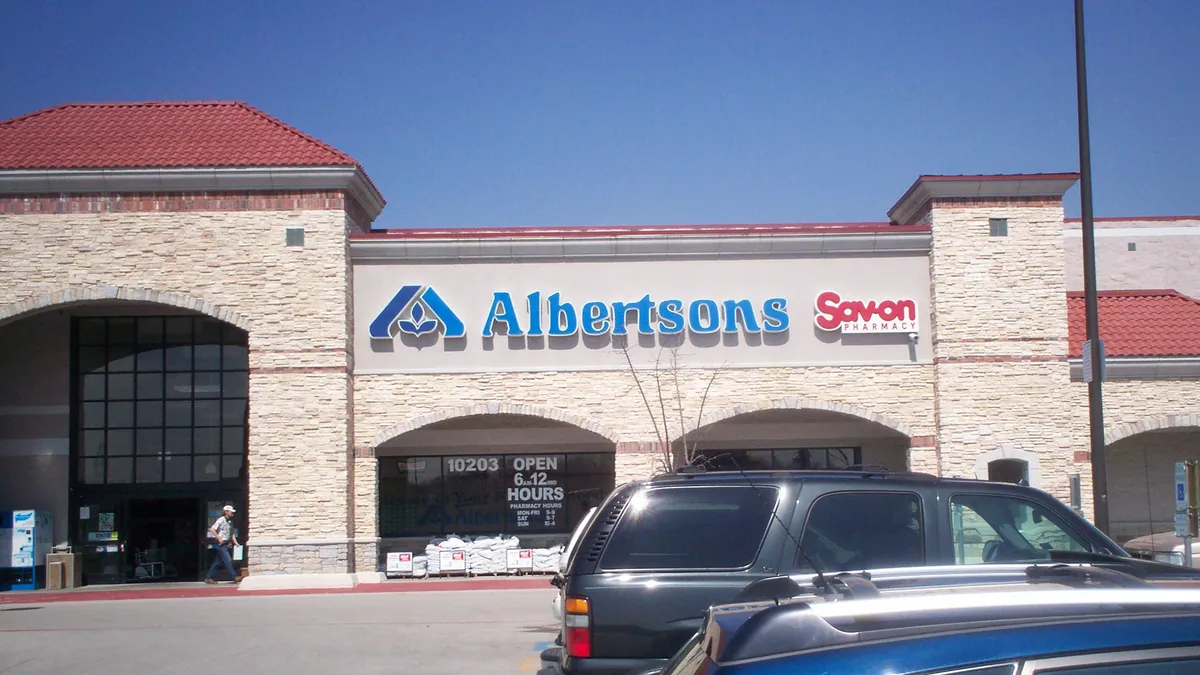Dive Brief:
- In an interview with the Idaho Statesman, Albertsons CEO Bob Miller said the retailer is “aggressively looking” to acquire “small, regional companies.” At the same time, Miller said Albertsons is focused on updating its current stores, with 200 remodeled over the past year and 200 more set for work this year.
- Miller also said Albertsons is “aggressively” expanding the chain’s home delivery service. The retailer currently offers countertop delivery service in eight of the ten markets it serves, and plans to expand further into metro markets like Chicago, where Miller believes the company’s Jewel-Osco stores can effectively compete with Amazon-backed Whole Foods’ e-commerce efforts.
- Miller said Albertsons’ decentralized approach has helped it succeed across numerous banners and locations. “Number one, we put people in charge who took care of their customers and employees,” he told the paper.
Dive Insight:
In his interview with the Idaho Statesman, Bob Miller uses the word “aggressively” on numerous occasions to describe Albertsons’ growth plans. The company, he says, is aggressively expanding its e-commerce efforts. It’s also aggressively remodeling stores and aggressively looking for acquisitions.
This is certainly appropriate coming from the head of the country’s fastest-growing grocery retailer. Under Miller — whose “quiet” personality, according to sources, belies his ambitious nature — Albertsons has experienced growth at breakneck speeds. After being hired as CEO in 2006 by Cerberus Management, which had purchased 655 stores, Miller cut hundreds of underperforming locations from the chain, then proceeded to grow the company through acquisition — most notably its $9.2 billion purchase of Safeway three years ago. Today, Miller heads up a retailer that controls more than 2,300 stores and 19 banners, including United Supermarkets, Tom Thumb and Jewel-Osco.
Albertsons’ footprint is widely varied and spread across the country, but that fits right in with Miller’s decentralized management style. His philosophy is to find the best people to run each arm of the company, give them access to Albertsons’ scale and expertise, and then let them do their job. In speaking about Albertsons’ 2013 acquisition of United Supermarkets in Texas, Miller had this to say:
“We didn’t put one person in there. The same people are running that company today, doing very well, in fact we’ve promoted a few people out of there. ... So we’re really a great candidate to buy independent chains and roll them under our umbrella.”
The company’s decentralized approach has help it become the second-largest grocery chain in the country. But larger prizes have eluded Albertsons. Over the past few years, the company has tried to initiate a public offering, but has had to back away. The most recent attempt came earlier this month, when its failed attempts to buy Whole Foods and Sprouts Farmers Market, along with low investor confidence following Blue Apron’s abysmal IPO, spurred the company to table its offer.
Despite its appetite for expansion, Albertsons couldn’t beat e-commerce giant Amazon’s offer for Whole Foods. Nor was it able to woo Sprouts Farmers Markets, according to reports. Either chain would have given Albertsons a coveted presence in the high-growth natural and organic industry.
These failures have been tough to swallow for Miller and Cerberus, which is no doubt anxious to see Albertsons expand its profitability before cashing out. But according to Miller, the company still plans to grow its footprint, mostly through small and regional chains. Albertsons is also focused on renovating its existing store base, and plans to become a leading provider of home grocery delivery. Its growth prospects here are by no means assured, but Miller and company are no doubt betting, as always, that fortune will favor the bold.









